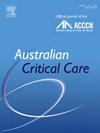Tracking Outcomes Post Intensive Care: Findings of a longitudinal observational study
IF 2.6
3区 医学
Q2 CRITICAL CARE MEDICINE
引用次数: 0
Abstract
Background
Many intensive care unit (ICU) survivors experience new or worsening impairments, termed post–intensive care syndrome. Substantial investment has been made in identifying patients at risk and developing interventions, but evidence remains equivocal. A more nuanced understanding of risk and outcomes is therefore warranted.
Objectives
This study aimed to describe patients’ health status 6 months after ICU discharge and characterise those with, and without, clinically significant physical, cognitive, or psychological impairments.
Methods
In this prospective, multisite observational study, patients discharged from four ICUs were screened and invited to participate. Consenting participants completed a questionnaire-based survey by telephone that encompassed preadmission characteristics and validated self-report questionnaires of physical and cognitive function, anxiety, depression, and post-traumatic stress disorder. Routine ICU data were collected from hospital records. Participants reporting clinically significant impairments were compared with those not reporting impairments on demographics and hospital data.
Results
A total of 132 participants completed 6-month follow-up: 30% reported impairments in any domain. Of these, 43% reported impairments in two or more domains. The rates of impairment varied between sites, ranging from 21% to 88%. Depression was most common, followed by physical impairment, anxiety, and cognitive impairment, with post-traumatic stress disorder being the least common.
Participants
Reporting impairments did not differ significantly from others on Acute Physiology and Chronic Health Evaluation II scores, delirium rates, mechanical ventilation rates, or duration and length of stay. Planned admissions were less common in the impairment group, as was inotrope use. Mental health diagnosis was not associated with post-ICU impairments.
Conclusions
This study demonstrates the heterogeneity of patients experiencing impairments after ICU discharge and highlights the importance of attending to patients’ unique circumstances, encompassing characteristics and treatment factors, when assessing risk and planning support. Whilst generalisability is uncertain, these findings support a whole of health service approach towards post-ICU recovery.
重症监护后的跟踪结果:一项纵向观察研究的结果。
背景:许多重症监护室(ICU)幸存者经历新的或恶化的损伤,称为重症监护后综合征。在确定有风险的患者和制定干预措施方面进行了大量投资,但证据仍然模棱两可。因此,有必要对风险和结果进行更细致的理解。目的:本研究旨在描述ICU出院后6个月患者的健康状况,并描述那些有或没有临床显著的身体、认知或心理障碍的患者的特征。方法:在这项前瞻性、多地点观察性研究中,筛选了4个icu出院的患者并邀请他们参加。同意的参与者通过电话完成了一份基于问卷的调查,包括入院前的特征和有效的身体和认知功能、焦虑、抑郁和创伤后应激障碍的自我报告问卷。常规ICU数据从医院记录中收集。报告临床显著损伤的参与者与没有报告人口统计学和医院数据损伤的参与者进行比较。结果:共有132名参与者完成了6个月的随访:30%的参与者报告了任何领域的损伤。其中,43%的人报告在两个或更多的领域受损。不同部位的损伤率不同,从21%到88%不等。抑郁症是最常见的,其次是身体损伤、焦虑和认知障碍,创伤后应激障碍是最不常见的。参与者:报告损伤的患者在急性生理和慢性健康评估II评分、谵妄率、机械通气率或住院时间和长度方面与其他患者没有显著差异。在损伤组中,计划入院的情况较少见,正性肌力的使用也是如此。精神健康诊断与icu后损伤无关。结论:本研究显示了ICU出院后出现损伤的患者的异质性,并强调了在评估风险和规划支持时关注患者独特情况的重要性,包括特征和治疗因素。虽然普遍性是不确定的,但这些发现支持对icu后康复的整体卫生服务方法。
本文章由计算机程序翻译,如有差异,请以英文原文为准。
求助全文
约1分钟内获得全文
求助全文
来源期刊

Australian Critical Care
NURSING-NURSING
CiteScore
4.90
自引率
9.10%
发文量
148
审稿时长
>12 weeks
期刊介绍:
Australian Critical Care is the official journal of the Australian College of Critical Care Nurses (ACCCN). It is a bi-monthly peer-reviewed journal, providing clinically relevant research, reviews and articles of interest to the critical care community. Australian Critical Care publishes peer-reviewed scholarly papers that report research findings, research-based reviews, discussion papers and commentaries which are of interest to an international readership of critical care practitioners, educators, administrators and researchers. Interprofessional articles are welcomed.
 求助内容:
求助内容: 应助结果提醒方式:
应助结果提醒方式:


